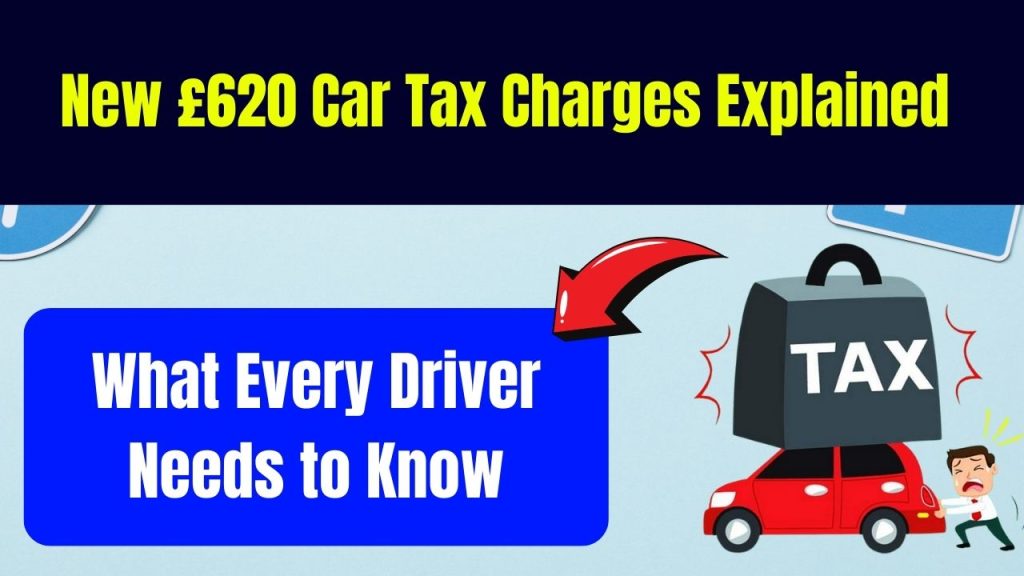New £620 Car Tax Charges Explained: From April 1, 2025, new car tax charges will come into effect across the UK, and if you drive or are planning to buy a car, this is news you can’t afford to ignore. Whether you’re a daily commuter, a car enthusiast, or someone considering a switch to electric vehicles (EVs), understanding how the upcoming changes to Vehicle Excise Duty (VED) affect you is absolutely essential.

The most headline-grabbing update is the introduction of a total annual £620 road tax charge on certain cars, including many electric vehicles, due to a reintroduction of the expensive car supplement. This change marks a significant shift in the government’s approach to taxing vehicles, especially those previously considered eco-friendly. But what does it all mean for you? Let’s break it down.
New £620 Car Tax Charges Explained
| Key Information | Details |
|---|---|
| Start Date | April 1, 2025 |
| Who Is Affected? | All car owners, especially those with cars over £40,000, including EVs |
| Standard VED | £195 annually for most cars |
| Expensive Car Supplement | Additional £425 annually for cars over £40,000 (years 2-6) |
| Total Annual VED (Over £40K Cars) | £620 per year |
| EV First-Year Rate | £10 |
| Official GOV.UK Resource | VED 2025 Tax Rates PDF |
The upcoming £620 car tax changes are a significant shift in how the UK handles road tax, especially for electric and luxury car owners. Whether you’re buying new, leasing, or managing a fleet, understanding the implications is crucial. With planning and smart choices, you can avoid surprise charges and stay ahead of the curve.
What Is Vehicle Excise Duty (VED)?
Vehicle Excise Duty, often known as road tax or car tax, is a tax levied on vehicles driven or parked on public roads in the UK. The amount you pay is determined by factors such as:
- Vehicle type
- CO2 emissions
- Fuel type (petrol, diesel, electric)
- List price (manufacturer’s original price before discounts)
- Date of registration
For years, electric vehicles were exempt from VED to encourage greener transport. But starting April 2025, that exemption ends.
Breaking Down the New £620 Car Tax Charge
The £195 Standard Rate
From the second year onward, most vehicles registered on or after April 1, 2017, will pay a standard rate of £195 annually.
The £425 Expensive Car Supplement
If your vehicle’s list price exceeds £40,000, you will pay an extra £425 per year for five years, starting in the car’s second year. This includes:
- Premium petrol/diesel cars
- Larger SUVs
- High-end hybrids
- Most new EVs, especially Teslas, BMW i-Series, and more
The Total: £620 Per Year
That means from years 2 through 6, drivers of these high-value vehicles will be charged £620 annually in VED.
Example: If you buy a new Tesla Model Y with a list price of £45,000:
- Year 1: £10
- Years 2 to 6: £620 per year
- Year 7 onwards: £195 per year
Why Is This Change Happening?
The UK government is adjusting its car tax policy in response to:
- Increased EV adoption and the loss of revenue from fuel duty
- Creating fairer tax systems across all vehicle types
- Encouraging people to consider the full lifetime cost of ownership, not just environmental benefits
While this may seem like a penalty for going green, it reflects the government’s need to maintain tax income as traditional fuel use declines.
Read more from What Car on the luxury car tax changes
How to Check If Your Car Will Be Affected
Follow these steps to find out if you’ll pay the £620 charge:
- Find Your Car’s List Price (not the price you paid)
- If it’s over £40,000, prepare for the extra charge
- Check your vehicle’s registration date
- Go to the GOV.UK Vehicle Tax Checker to verify your current rate
What About Electric Vehicles (EVs)?
This is the biggest shake-up for EV owners. Previously zero-rated, EVs registered on or after April 1, 2025, will face:
- £10 first-year rate (instead of zero)
- £195 standard rate thereafter
- + £425 supplement for EVs with a list price over £40,000
For EVs registered before April 2025, VED exemption remains until 2025, after which the new rules will apply.
Drive Electric explains the EV tax change in detail
What This Means for Car Buyers
For First-Time Buyers
Budget carefully. That new EV or luxury SUV might have hidden annual costs you didn’t expect.
For Company Car Drivers
Expect changes in Benefit-in-Kind (BIK) and tax calculations. These can significantly affect your monthly salary deductions.
For Fleet Managers
Update cost projections for all vehicles exceeding £40,000. This may shift preferences toward models just under the threshold.
For Environmentally-Conscious Buyers
EVs are still more economical long-term (lower fuel, fewer repairs), but the tax edge is narrowing.
UK Seniors to Receive £5,285 PIP: Check the Official 2025 Payment Dates!
UK Bank Holidays 2025; When, Where & How to Plan a Dream Getaway!
How Much Will You Earn? 2025 UK Minimum Wage Update – Check the Latest Figures!
FAQs About the New £620 Car Tax
Will this affect used cars?
Only if the original list price was over £40,000 and it’s within the 2nd to 6th year of registration.
Is the list price what I paid for the car?
No. It’s the official price before discounts or deals.
Do hybrids count?
Yes. Plug-in hybrids and full hybrids are subject to the same rules.
Can I avoid the £620 charge?
Yes. Choose a car with a list price under £40,000 or buy used models already past the 6-year mark.
Are motorbikes or vans included?
No. This rule specifically applies to cars. Vans and motorcycles have separate tax classes.











